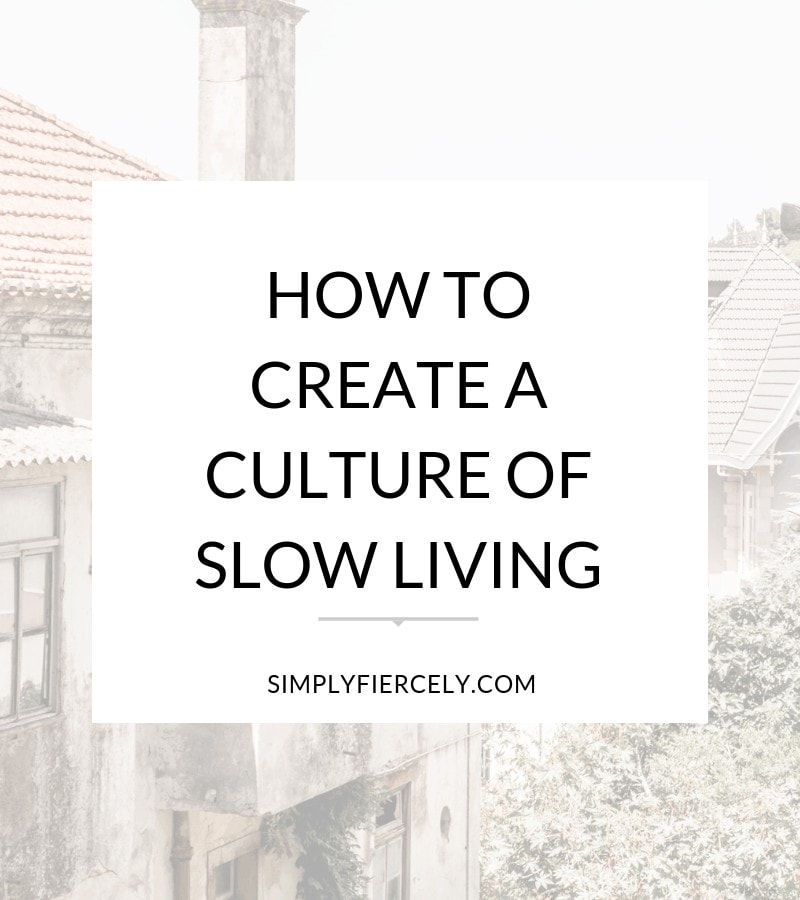These days, it feels like almost every conversation begins with a statement of busyness:
“I’m good thanks, just busy.“
We hear it so often that it doesn’t even feel like a complaint anymore. It’s almost as if being busy has become synonymous with being fine; we’re no longer concerned by the admission. Instead, we nod our heads in agreement because we feel the same way—doesn’t everyone?
Sadly, I think so. Most of us have accepted that never-ending to-do lists and jam-packed schedules are a normal part of modern life.
But what if that wasn’t the case? What if instead of embracing exhausted and overwhelmed as cultural norms, we all decided to take small, intentional steps in the opposite direction? What would a slow, minimalist lifestyle look like?
While I won’t pretend to have all the answers, I think there are ways we can actively work towards creating a culture of slow living—a society where our collective self-worth isn’t defined by how much we do and how much we consume.
Here are a few ideas that I’m exploring and I invite you to join the conversation too; how can we work together to choose simple and slow over cluttered and busy?

CREATING A CULTURE OF SLOW LIVING
WHAT WE SAY MATTERS TO SLOW LIVING
As I’ve already mentioned, talking about how busy we are has become a cultural norm. It’s often the first thing we say in greeting and it sets the tone for the conversation—so I think it’s an ideal place to start.
As a community, how would our lives be different if we stopped putting busyness at the centre of our conversations? And while we’re on the topic, what if we stopped using mindless complaining as our main form of connection?
(Have you ever noticed how complaining about something is often the easiest way to break the ice in a room full of strangers? I’m definitely guilty of this.)
It might be the easiest option but I think we deserve better. Mindless complaining drains our energy and adds to the mental load of those around us without providing any value in exchange.
This isn’t to say that we should never talk about what’s bothering us—of course, it’s important to have honest conversations with people! But there’s a fine line between a having a meaningful discussion and mindlessly complaining (which is usually done out of habit or motivated by boredom).
I think that collectively, we all need to question how what we’re saying brings value to the table. Are you making a genuine contribution or simply making noise?
This feels especially relevant online. Have you ever replied to a Facebook comment just to have your voice be heard? I’ll admit that I’m tempted to do this all the time and that often, I have to actively stop myself by questioning my motives.
To be clear, I do believe we can have meaningful conversations online or on social media (obviously!) but I think we need to be especially mindful about it because it’s an easy place to lose yourself.
Finally, if we want to welcome slow and simple into our lives, then I think we need to get comfortable with silence. Silence creates the space we need to reflect on our thoughts—so that when we do speak, we add value and not mental clutter.
Related Post: Why Your Life is Busy + Cluttered (Plus What to Do About It)
ENCOURAGING BOUNDARIES
Another essential element of slow living is establishing, maintaining and encouraging boundaries. Boundaries also create space: space for rest, space for reflection, space for meaningful relationships and so much more.
Boundaries are how we make sure that there’s time, energy and money for the things that matter most and without them, it’s easy to end up exhausted and overwhelmed.
Still, despite the many benefits of maintaining boundaries, many people resist the idea.
For some, it’s a decision made out of fear. Many have internalised the belief that being “good” (good parents, good employees, or good friends) means being available at all times. As a result, they view boundaries as a sign of weakness, evidence of failure, or perhaps even as morally wrong.
I’d like to argue the opposite. I believe that it’s our responsibility to create boundaries and lead by example.
When we value our time and honour ourselves by creating boundaries, we are giving others permission to do the same. It might sound silly but in a society where busy and stressed has become “normal”, establishing boundaries can be a radical act of leadership.
I can remember a former manager who only answered emails twice a day; perhaps not “radical” by any stretch of the imagination but at the time, it shocked me. This simple act gave me the courage to push back on the relentless demands of my work life and to create the space I needed for my own wellbeing.
Keep in mind that if we’re serious about creating a culture of slow living then it’s not just about making changes to our own lives—we must also invite others to do the same. This is both a generous and selfish act because as you may have realised, it’s not easy to live “slowly” is a busy world.
Whether we like it or not, we’re all in this together.
Related Post: 10 Ways to Slow Down a Busy Day

SLOW LIVING + OUR ENVIRONMENT
Regular readers won’t be surprised to hear that I think decluttering is a crucial part of slow and simple living, but let’s unpack this idea a bit further.
For many, a decluttered home is about achieving a certain aesthetic and while this is true, for me the real value of a decluttered home is how you feel in your living space.
Does your home invite you to sit and rest? Does it encourage long, lingering conversations with friends? Do you feel calm and at ease?
In the words of author and professional organiser Christina Scalise, “Clutter is the physical manifestation of unmade decisions fueled by procrastination.” (Oof. How’s that for a truth bomb!)
What this means is that a home full of clutter is practically a living breathing to-do list, constantly reminding you of all the things you’re putting off doing.
Even if you’re not following through with the implied actions, you’re likely to feel busy and overwhelmed—and so will the people you invite into your home.
Of course, our homes are personal and I don’t think it’s our responsibility to present them in any particular way but as the saying goes, it all starts in the home. Most of us spend a lot of time there and if our homes support slow living, we’ll carry this feeling with us throughout the day.
If you need support decluttering your home, you might be interested in Mindful Decluttering, my free decluttering guide and workbook. Get your copy by subscribing below or click here to learn more.
WHO WE SUPPORT
Finally, another way we can create a culture of slow living is by voting with our dollars. Let’s be intentional in making choices that align with our vision for the future.
This will mean different things to different people but it might look something like:
- shopping less (quality over quantity)
- eating local and seasonal food
- supporting companies who take care of their employees (paid leave, health benefits, etc.)
- buying secondhand
On the surface, some of these choices might seem to contradict slow living because they require an investment of time, energy and often money.
They might even make us busier, at least in the short term. (For example, shopping secondhand usually requires more time and effort than shopping at the mall.)
However, I think if we’re serious about creating a culture of slow living then we must be mindful about how our choices impact society as a whole.
Buying secondhand might take longer but it saves resources. Supporting ethical businesses might cost you more but you’re giving someone else the gift of sick leave when they need it. Are these tradeoffs worth it? I think so.
Start where you are and do what you can. Some can do more than others because they had more to begin with (more time, money, energy or even power). Just do the best you can with what’s available to you.
The same goes for everything on this list. I truly believe it’s the small decisions we make every day that matter most. Everything from taking the time to truly listen to a friend, to saying “no” when you want to, to shopping less often … it all adds up.
Related Post: 20 Ways I’ve Simplified My Life
FINAL THOUGHTS ON SLOW LIVING
Obviously, this post is just the tip of the iceberg. There’s so much more that I could say about creating a culture of slow living (particularly about how what we say matters) but I’m mindful that this post is getting quite long!
I don’t want to unwittingly veer into “noise” territory, so I’ll leave you with this final thought: if you want to embrace slow living, celebrate slow living.
Look for tiny opportunities every day—space to enjoy life—then let your joy be seen and watch what happens. ✨
OK—I know you’ve must have some ideas to share! Let me know your thoughts in the comments. What are your thoughts on rejecting busy and creating a culture of slow living? x


LOVE this!
Thank you, Lara! 🙂
I love the idea of having more time for me, of having control over my life… Slow living is about quality and that is something the we are in need in most aspects of our lives. Thank you for sharing your thoughts!
The one thing I have taken from this pandemic is to slow down. To make time for what matters and to stop being in ‘working mode’ all the time.
I agree that complaining is an unhealthy way to create connection, but I find myself falling into it because the opposite feels like bragging. I don’t want to tell everyone how well my daughter did on her swim team. My son is doing wonderfully at work, and he will transfer to his college of choice in the fall. I don’t have casual conversation — news sharing — that’s not complaining or bragging. So what should we do?
I’ve caught myself falling into the trap of complaining (mostly since covid) and I think the answer to neither complaining nor bragging lies in a growth mindset, I’ve found when approaching convo with a growth mindset, they are enlightened and meaningful. If I do have a problem I need to workout with a friend, this could look like stating the problem (unbiased facts, not opinions about it), how it makes me feel, and how I’m struggling to overcome it, and then offer the ideas I’ve come up with and see what their thoughts are. I think if you enter into a convo this way, a problem which would previously be viewed as a complaint can be turned into a growth opportunity for both people involved in the convo. It’s much more meaningful and leaves you feeling enriched rather than drained. Hope that helps!
Very helpful! Thank you.
Your friends will be happy to hear about how well your kids are doing. True friends like to hear good news!
Great post!
I love how you mention bringing slow living into our conversations.Taking the time to reflect and get clear on whether we are adding value is truly so important. It is something I’m trying to be more intentional about in my life as well.
Appreciate you!
I have to say that “slow living” does not exactly resonate with me. I like FAST! I like busy! I like being surrounded by interesting projects and stimulating collections!
Until…
I don’t. I can’t.
A series of health issues (surgeries, chronic illness) and suddenly I was Dorothy in the tornado. It wasn’t Kansas any more.
Now I believe that what I was doing and how I was doing it was an addiction. And change, at almost 70 years old, is not easy, particularly when this is the norm for our culture. One of the things that made this so very clear was our venture into camping with a new, beautiful, fully outfitted (by me) 27 foot trailer. Basically, I grab my purse, my tote, my laptop, and a few things from the fridge and we’re off. It’s like staying in a nice hotel only with all the comforts of home. I can sit in my zero gravity chair looking around at absolutely nothing I have to do. The contrast with my life at the house was startling, especially as I realized WHY my house was always in a mess. No one could keep up with what I was trying to do, least of all a 70 year old woman with a dog, a dependent husband, a huge garden – and a chronic disease.
Now I have interviewed a couple of companies. One of them is the national franchise “Caring Transitions,” the other is an independent entity offering a little different services. Both of them offer de-cluttering assistance, dispersing your trash, donations, and organizing the sale of what you need to get rid of. I just bought a quick scanner and a shredder on line and I will be ready to schedule my helpers. I am going to get this house DONE. Ready to put on the market so I can move to Senior Spa Living! That may be next year, or the year after, at which point I will call my helpers again to stage my home, sell anything I am not taking to my new living space, right down to arranging the actual move. They even have counselors to help with the emotional adjustments!
My post is too long, but detail was needed because I want others to realize that the way we are living, with so much stuff, so many expectations, directly leads to stress. And stress is the major component to every malady we share in this day and age. Like chronic illness. Like heart disease. Like cancer.
If we truly are intelligent, surely we can make the changes we must to have more fulfilling lives that are healthier in every way. There are so many resources now to help us, like this blog!
I am committed to this change..
I hope you are too.
Your post really resonated with me and I found it very helpful.
I love your spunk , your approach and your attitude!
Wonderful post.. I try to avoid talking about how busy I am, because I don’t think it’s really a virtue and shouldn’t be a measure of importance or self-worth.
Ohhh, I love this post! What you say about complaining as a form of connection is so true; British small talk is basically complaining about the weather (on the rare occasions it’s not cold, dreich and wet, it’s too hot and humid for our delicate constitutions 😛 ). And as easy as it is to connect with people via a communal moan, it’s not really the most uplifting or optimistic way to go about it, is it?